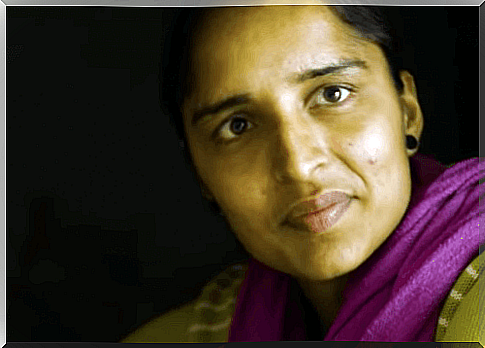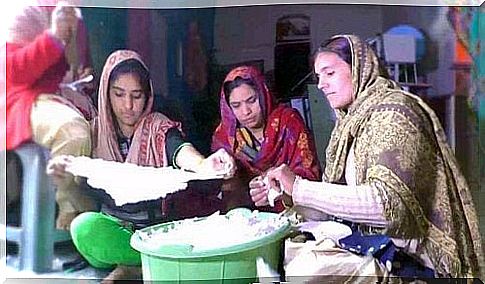Stigmat Around Menstruation: Women’s Revolution In India

This article will talk about the excellent documentary Period. End of Sentence, which premiered on Netflix a while ago. It tackles customs, stereotypes and taboos that still characterize the lives of women in India. More specifically, it talks about the stigma surrounding menstruation.
It is a taboo that many movements in India are trying to eliminate. Female menstruation. Even though it is considered normal in the western world, it is still one of the biggest obstacles for women in this country – and often in ways that are not noticed.
Although it is a basic process in women , people have been hiding, criticizing and demonizing it for centuries. The good news is that a group of women in India have decided to change the way their environment looks at something as natural as menstruation.
A silent battle
This documentary takes place in an area of the Indian countryside called Hapur, near Delhi. There is undoubtedly a female revolution in India, but the countryside still clings to old customs. Some traditions still bind these people in the past.
For example, women have to make do with a life at home and arranged marriages. They often stop going to school and instead become mothers without any future of their own.
Some time ago, some women in a small community in Hapur began a silent revolution against stigma that is deeply rooted in culture. Menstruation is taboo in Indian culture, but today women have decided to lay the groundwork for their awakening.
It was not long since sanitary napkins began to be offered in the Indian market. However, since you can only find them in the big cities , they are practically inaccessible to most women, in addition to being expensive. However, the “bandage project” did turn an abandoned house in Hapur into a factory where women of all ages can make their own bandages, and they also sell them in stores.
By doing so, they have come up with a solution to a problem that is a major obstacle for most women. They have created a cooperative association where women receive compensation for their work. For many, this is the first time they have been paid in their lives.
Stigma around menstruation and abandoning studies
Probably the most serious problem that the stigma surrounding menstruation poses for women in India is that many women still stop going to school when they start menstruating.
This is actually an ancient tradition that marks the point when women begin their fertility. Therefore, they have to abandon everything else to get married and have children. People in India still consider menstruation to be something shameful and disgraceful. Many women see themselves as unclean, which prevents them from entering and praying in temples. This is even done in temples dedicated to Hindu goddesses. So absurd is the stigma surrounding menstruation.
Although many women in India find a way to escape early marriage thanks to their education, many leave school voluntarily when they start menstruating. Often they do not have enough space to take care of their hygiene, and everyone uses the pieces of fabric that they bury after use. This is something they can not do in schools in a convenient and private way.

The Bind project and women in India
The idea for the bind project came from the city of Los Angeles. This non-profit organization managed to raise the money required for the first machine for 99% biodegradable bandages purchased by the women of Hampur.
The economic liberation it has given these women is great. It has helped provide income for these women and their families, but it has also had other significant side effects. On the one hand, women have won the respect of men in their society, and on the other hand, it has helped them to pay for the education of younger women.
The brand they sell the pads under is called Fly. They chose this symbolic name thanks to the project’s goal: to finally let women in India spread their wings and fly.
To overcome ignorance
The stigma surrounding menstruation in India is synonymous with ignorance. The documentary shows young men from Hapur who do not know what menstruation is. Some believe that it is a disease that affects women to a greater extent than men.
For many of the men in the area, this project has meant that they have been able to stop being ignorant, and instead learn about the feminine and masculine world. The women in the Bind project hope to be able to eliminate the stigma surrounding menstruation one day.
A project so simple and accessible has really caught everyone’s attention. It is a peaceful revolution that fills women with the hope that the ignorance and stereotypes that have existed for centuries can finally end.








